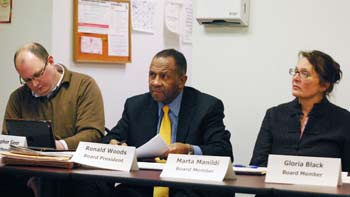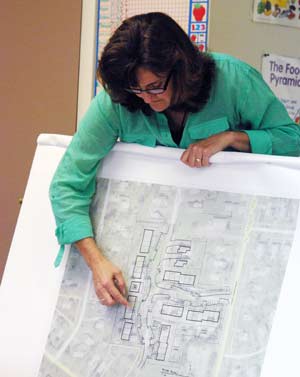Public Housing Conversion Takes Next Step
Ann Arbor housing commission meeting (Jan. 15, 2014): Transitions for Ann Arbor’s public housing will continue in the new year, even while the housing commission is also dealing with the aftermath of a major fire in one of its complexes.

From left: Ann Arbor housing commission board members Christopher Geer, Ron Woods and Marta Manildi at the AAHC Jan. 15, 2014 meeting, held at Baker Commons. Not pictured here is Tim Colenback, the newest appointment to the AAHC board. Gloria Black, who represents AAHC residents, was absent. (Photos by the writer.)
At their first meeting of the year, commissioners were briefed about the impact and aftermath of a Jan. 8 fire at Green Baxter Court, a public housing complex on Green Road next to Baxter Park on the city’s east side. They heard from Joan Doughty, executive director of Community Action Network, which operates a community center at that complex under contract with the city. CAN staff are helping AAHC provide support for families who were displaced by the fire.
At their Jan. 15 meeting, board members authorized up to $9,000 in extra funds to help pay for that emergency work. CAN is also seeking additional donations from the community.
In separate action, the board amended Chapter 14 of its housing choice voucher administrative plan to include a preference for families that have been involuntarily displaced due to a fire, natural disaster or any other reason. The vouchers would be used to subsidize rental housing, if no units are available in the city’s public housing system.
The Jan. 15 meeting also included an update from Lori Harris, vice president with Norstar Development, on a major initiative to upgrade the city’s public housing units. Specifically, she presented Norstar’s recommendation for an equity partner to purchase low-income housing tax credits awarded by the state to AAHC late last year. The board approved the recommended firm, Red Stone Equity Partners.
Investors had responded positively to Norstar’s request for proposals, Harris said, with higher-than-expected offers. “You have a very, very good story here, and it’s played very, very well in this process,” she told the board. The tax-credit transaction will provide the majority of funding for renovating five public housing complexes: Miller Manor, South Maple, Baker Commons, Hikone and Green Baxter. These properties make up the majority of public housing units in the AAHC portfolio – 248 out of a total 326 units.
However, AAHC executive director Jennifer Hall told the board that additional funding will still be required. As part of that, the AAHC is requesting $600,000 from the Ann Arbor Downtown Development Authority. Hall said she expects the DDA board to make a decision on that by March or April. The DDA previously gave the housing commission a $300,000 grant for capital improvements at Baker Commons, which is located within the DDA district. That approval came in March of 2013. And in October 2012, the DDA had provided a $260,000 grant primarily for replacing the Baker Commons roof.
In other action, the AAHC board approved a 3% cost-of-living adjustment for Hall, in line with other COLA increases given to city employees. The board also authorized changing the way its minutes are kept in order to begin using the city’s online Legistar system. The new approach will be less detailed in reporting deliberations, and will primarily provide a report on the outcome of action items. Currently, AAHC board minutes and board packets aren’t part of Legistar, but are provided on the AAHC page of the city’s website. Minutes from the AAHC board meetings are also attached to the city council agenda as an item of communication.
And near the end of the meeting, commissioner Marta Manildi reported that she is not seeking reappointment. Her term ends this spring, but she has offered to step down early. She was praised for her work in helping lead the AAHC through a difficult transition several years ago. Speaking during public commentary, Doughty said Manildi “really led the charge for a turnaround that’s been amazing to witness.”
A week later, at the Ann Arbor city council’s Jan. 21 meeting, mayor John Hieftje nominated Daniel Lee to serve out the rest of Manildi’s term. A confirmation vote is expected at the council’s Feb. 3 meeting. Hieftje described Manildi’s service on the commission as profound and beneficial. [Full Story]




